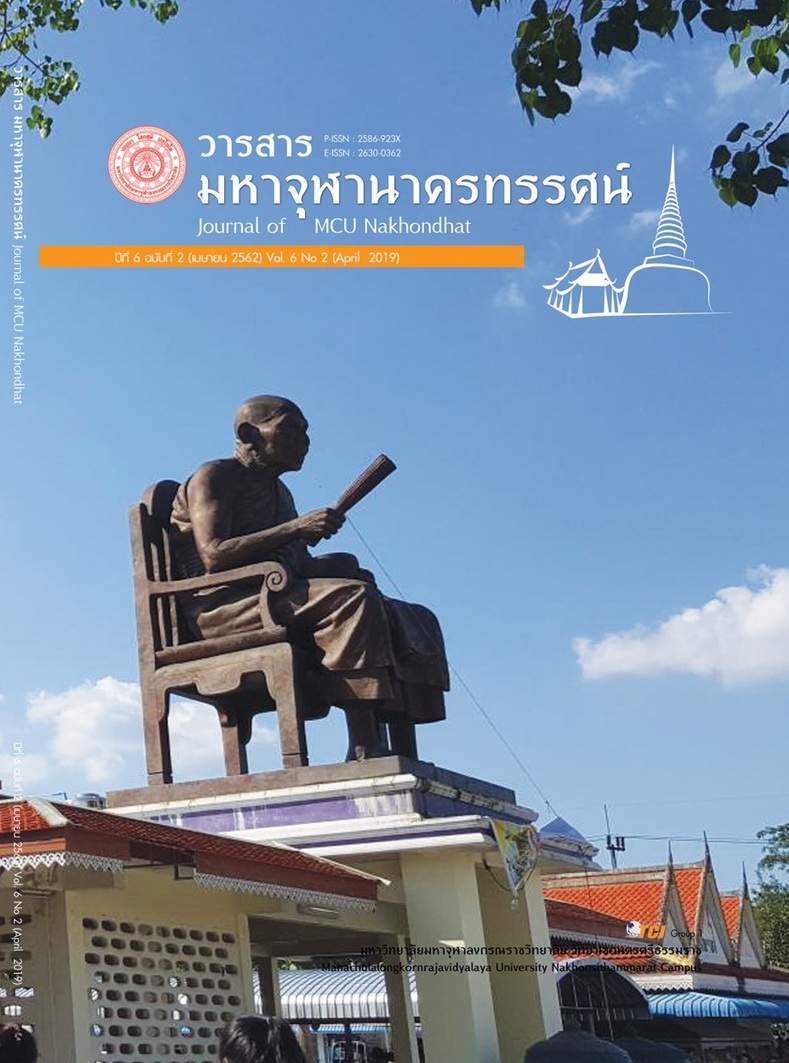A POTENTIAL DEVELOPMENT MODEL OF FACILITATOR MONKS FOR MIND REMEDIES OF GILANADHAMMA.
Main Article Content
Abstract
The purposes of this research were: 1) to study the training process of the Gilanadhamma Group in the project to strengthen potentiality of the venerable speaker (Venerable Seminar 4) 2) to lesson learned the training process in the project to strengthen potentiality of the venerable speaker (Venerable Seminar 4) by the Gilanadhamma Group and 3) to present the training model of the Gilanadhamma Group in the project to strengthen potentiality of the venerable speaker (Venerable Seminar 4). Using qualitative research by using in-depth interviews and focus group discussions of participants, and participatory observation in the training process in data collection
The results of research were found as follows: Satisfaction with the project to strengthen potentiality of the venerable speaker (Venerable Seminar 4), in the overall at a high level (= 4.3) and research results, lessons learned summarize in 3 important issues, including personalities, speakers Techniques, processes and results are as follows: 1) Personality: the personality of the venerable speaker, the Gilanadhamma group who is the leader of the process, has knowledge, capability is accepted, behavior reflects the kindness, have teamwork skills, keeping the sacredness in the monkhood. 2) The process technique: is the process of the speaker of the Gilanadhamma group which has been used to create the learning process which consists of the technique of tea prayer, aesthetic conversation, deep listening, movie media, lectures, summarizing issues and spiritual pray. 3) The result: is what happens to the monks who participate in the activity, including new knowledge, practice listening and communication skills, Learning through direct experience, discovered the identity, get a good model, has a network of friendly Sangha.
Article Details
References
บัญชา จำปารักษ์ และคณะ. (2553). การประเมินประสิทธิภาพการสอนวิชาธรรมะภาคปฏิบัติ. ใน รายงานการวิจัย (หน้า ก-ข). สถาบันวิจัยพุทธศาสตร์ : มหาวิทยาลัยมหาจุฬาลงกรณราชวิทยาลัย.
ประทีป พืชทองหลาง. (2556). รูปแบบการปรึกษาเชิงพุทธตามหลักกัลยาณมิตร. ใน พุทธศาสตรดุษฎีบัณฑิต (สาขาพระพุทธศาสนา) (หน้า 159). พระนครศรีอยุธยา: มหาวิทยาลัยมหาจุฬาลงกรณราชวิทยาลัย.
พระครูสมุทรประภากร (เฉลิม ปภงฺกโร). (2557). การพัฒนาศักยภาพของพระอุปัชฌาย์ในเขตการปกครองคณะสงฆ์ภาค ๑๕. ใน วิทยานิพนธ์พุทธศาสตรดุษฎีบัณฑิต (สาขาวิชาการจัดการเชิงพุทธ). บัณฑิตวิทยาลัย : มหาวิทยาลัยมหาจุฬาลงกรณราชวิทยาลัย.
พระครูสาธกธรรมวิจิตร (อนันต์ ฉนฺทกาโม). (2557). การพัฒนาการเทศน์มหาชาติในจังหวัดพระนครศรีอยุธยา. ใน วิทยานิพนธ์พุทธศาสตรดุษฎีบัณฑิต. บัณฑิตวิทยาลัย : มหาวิทยาลัยมหาจุฬาลงกรณราชวิทยาลัย.
พระปณต คุณวุฑฺโฒ (อิสรกุล). (2554). ผลของการเยียวยาความเศร้าโศกของผู้สูญเสียบุคคลอันเป็นที่รักด้วยกิจกรมทางพระพุทธศาสนาและการปรึกษาเชิงพุทธจิตวิทยา. วารสารสมาคมจิตแพทย์แห่งประเทศไทย ปีที่ 56 ฉบับที่ 4 (ตุลาคม-ธันวาคม 2554), 403-411.
เลิศชาย ปานมุข. (27 กรกฎาคม 2560). แนวทางการถอดบทเรียนงาน/โครงการ/กิจกรรม. เข้าถึงได้จาก https://www.lertchaimaster.com/forum/index.php?topic=47.0
อุทัยทิพย์ เจี่ยวิวรรธน์กุล. (28 กรกฎาคม 2560). กิจกรรมถอดบทเรียน: จากแนวคิดสู่การปฏิบัติ. เข้าถึงได้จาก https://www.elearning.ns.mahidol.ac.th/km/index.php/lo-and-km/70-2015-03-21-02-20-05

